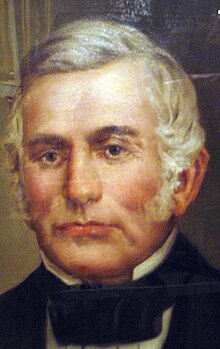Lilburn Boggs
Lilburn Williams Boggs (born December 14, 1796 in Lexington , Kentucky , † March 14, 1860 in Napa County , California ) was an American politician and from 1836 to 1840 the sixth governor of the state of Missouri .
Early years and political advancement
Boggs attended local schools in his home in Kentucky. In 1816 he moved to what was then the Missouri Territory . In his new home he worked in banking and as a trader.
In 1826 he was elected to the Missouri House of Representatives. He then became a member of the State Senate . He held this mandate until 1832. In that year he was elected as the candidate of the Democratic Party for the new lieutenant governor of his state. He held this office until 1836. On September 30, 1836, Governor Daniel Dunklin resigned from office to accept a position in the federal administration. As a result, Boggs was his successor as his deputy.
Missouri governor
Initially, Boggs only had to end Dunklin's remaining term. In the same year he was elected the new governor himself. His four-year term began on November 23, 1836. During his tenure, the school system was promoted and the Bank of Missouri was founded. In addition, the state capitol was built. At that time, there was also a conflict between the governor and the Missouri-based Mormons . Their way of life met with rejection from other settlers and tensions developed in the country, which the governor ended with the expulsion of the Mormons . For this purpose he used the National Guard. As a result, the Mormons were driven out of Missouri in 1838 under their protest. The deportation order wasn't lifted until 138 years later by Governor Kit Bond .
Another résumé
Even after the end of his tenure in November 1840, Boggs remained politically active. Between 1842 and 1846 he was again a member of the Missouri Senate. In 1842 he was assassinated, in which he was seriously injured. Mormon revenge was believed to be behind the crime. However, clear proof of this could not be provided. One suspect was acquitted for lack of evidence.
Boggs moved to California in 1846. There he settled in Sonoma . He ran a thriving shop during the gold rush. After that he was a mail administrator in Sonoma. From 1852 to 1855 he was also a member of the California state parliament . In 1855 he retired in Napa County. He died there on March 14, 1860. Lilburn Boggs was married twice and had a total of twelve children.
Web links
- Lilburn Boggs in the National Governors Association (English)
- Lilburn Boggs in the database of Find a Grave (English)
| personal data | |
|---|---|
| SURNAME | Boggs, Lilburn |
| ALTERNATIVE NAMES | Boggs, Lilburn Williams (full name) |
| BRIEF DESCRIPTION | American politician |
| DATE OF BIRTH | December 14, 1796 |
| PLACE OF BIRTH | Lexington , Kentucky |
| DATE OF DEATH | March 14, 1860 |
| Place of death | Napa County , California |



